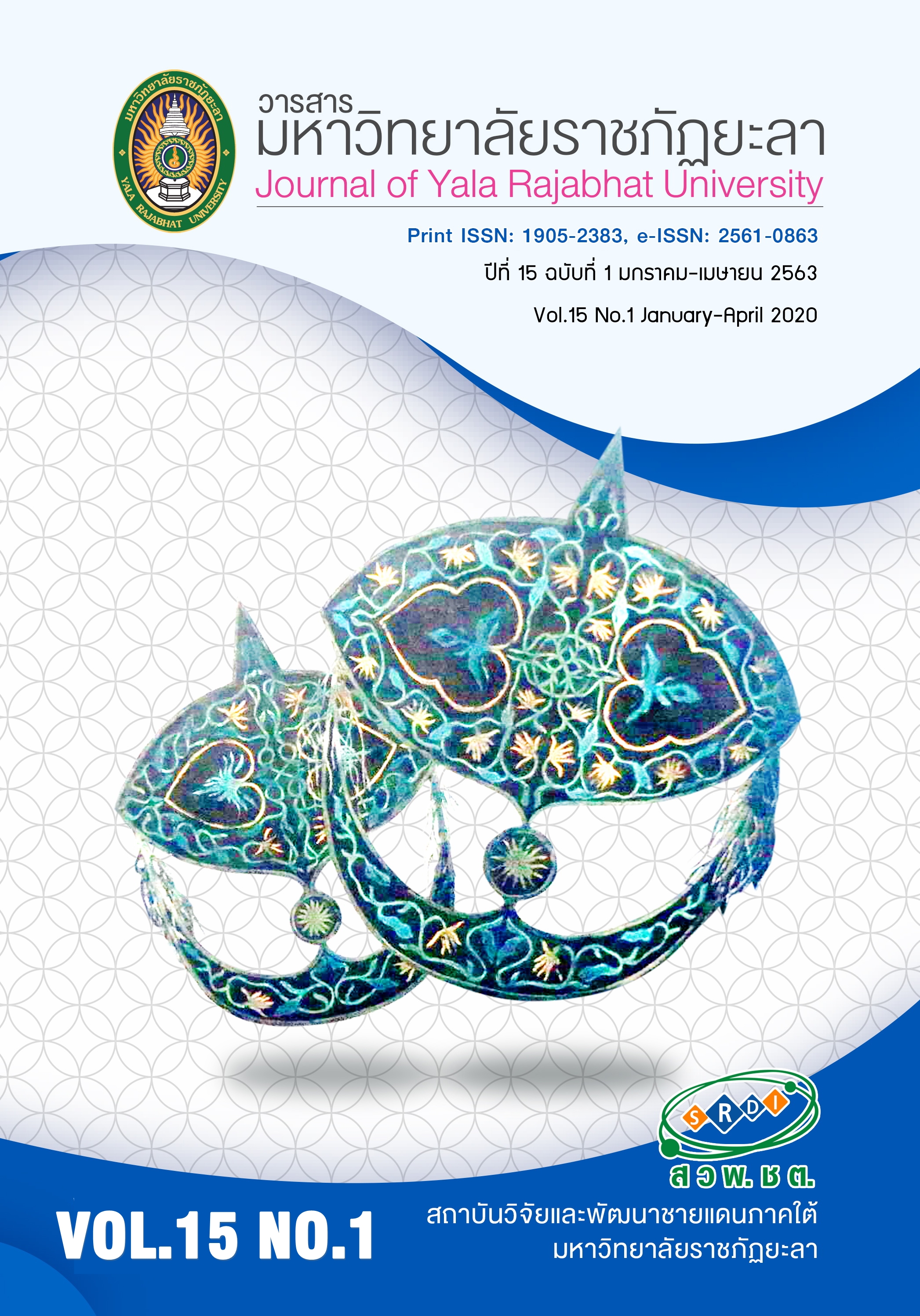การพัฒนาคุณลักษณะผู้นำทางการศึกษาแบบท่านนบีมูฮัมหมัด สำหรับผู้บริหาร โรงเรียนเอกชนสอนศาสนาอิสลามจังหวัดชายแดนภาคใต้
Main Article Content
บทคัดย่อ
บทความวิจัยนี้เป็นการวิจัยเชิงเอกสาร (Literature Research) ด้วยวิธีวิเคราะห์เอกสาร (Content Analysis) ใช้การพรรณนาวิเคราะห์มีวัตถุประสงค์เพื่อศึกษาการพัฒนาคุณลักษณะผู้นำทางการศึกษาแบบท่านนบีมูฮัมหมัด ผลจากงานวิจัยของนักวิชาการหลายๆท่านพบว่าการพัฒนาคุณลักษณะผู้นำทางการศึกษาแบบท่านนบีมูฮัมหมัด มีองค์ประกอบดังนี้ 1) หลักการพัฒนาได้แก่หลักความศรัทธาต่อพระองค์อัลลอฮฺ หลักความยำเกรงต่อพระองค์อัลลอฮฺ หลักความเมตตา และหลักความพอเพียง 2) กระบวนการพัฒนาประกอบด้วย ขั้นการศึกษาเรียนรู้ ขั้นการลงมือปฏิบัติประกอบด้วยปฏิบัติทางกาย วาจา และใจ 3) เทคนิควิธีประกอบด้วย วิธีการพัฒนาจิต วิธีการศึกษาเรียนรู้ด้วยตนเอง วิธียึดตามแบบอย่างท่านนบีมูฮัมหมัด และวิธีการสร้างความเคยชินต่อการปฏิบัติตามแบบอย่างท่านนบีมูฮัมหมัด 4) ผลลัพธ์ได้แก่ระดับคุณลักษณะผู้นำทางการศึกษาแบบท่านนบีมูฮัมหมัด ใน 4 ด้านประกอบด้วย 1) ด้านการมีความสัจจริง (Al-Siddiq) 2) ด้านความน่าเชื่อถือ/รับผิดชอบ (Al-amanah) 3) ด้านการเผยแผ่ และสื่อสารคำสอนอิสลาม (Al-Tabliqh) และ 4) ด้านความฉลาด และมีความรู้กว้างขวาง (Al-Fathanah) และแนวทางการพัฒนาคุณลักษณะผู้นำทางการศึกษาแบบท่านนบีมูฮัมหมัดใน 4 องค์ประกอบดังกล่าวข้างต้น
Article Details
บทความ ข้อมูล เนื้อหา รูปภาพ ฯลฯ ที่ได้รับการเผยแพร่ในวารสารมหาวิทยาลัยราชภัฏยะลานี้ ถือเป็นลิขสิทธิ์ของวารสารมหาวิทยาลัยราชภัฏยะลา หากบุคคลหรือหน่วยงานใดต้องการนำทั้งหมดหรือส่วนหนึ่งส่วนใดไปเผยแพร่ต่อหรือกระทำการใดๆ จะต้องได้รับอนุญาตเป็นลายลักษณ์อักษรจากวารสารมหาวิทยาลัยราชภัฏยะลาก่อนเท่านั้น
เอกสารอ้างอิง
2. Budiharto, S. (2007). Grow and Develop Prophetic Leadership. The International Conference, August 9-11, 2007. Yogyakarta: Gajah Mada University.
3. Budiharto, S. & Himan, F. (2006). The theoretical Constructs and Perceptual Measurements of Prophetic Leadership. Journal of Gajah Mada University, 33(2), 133.
4. Fauzan, A. N. & Budiharto, S. (2009). The Relationship between Perceptions of the Superior Leadership of Employees and Employees. Master Thesis. Indonesian Islamic University.
Indonesia, R. (2011). The Holy Al-Quran. Jakarta: Indonesia Republic Press.
5. Kao-ian, J. (2013). Relationship between Leadership and Administrative Performance of Educational Administrators in Three Southern Border Provinces. Journal of Yala Rajabhat University, 8(1), 40-51. (in Thai)
6. Kheowsri, P. (2005). A Proposed Model for Leadership Development of School Administrators in School-Based Management Schools. Doctor of Philosophy Thesis. Chulalongkorn University. (In Thai)
7. Khoirunnisa, L. (2016). The Relationship between Reading Habits of Asmaul Husna with Emotional Intelligence of 4 Student Grade Madrasah Aliyah Nurul Ummah Yogyakarta. Bachelor Degree Thesis. Islam Negeri Sunan Kalijaga University.
8. Prommeened, P. (2009). Leadership Development Model from Buddhism Principle. Doctor of Philosophy Thesis. Naresuan University. (in Thai)
9. Taufan, A. B. & Budiharto, S. (2008) The Proses of Prophetic Leadership Development. Master Thesis. Indonesian Islamic University.
10. Zulaikhah, S. (2005). Education Leadership Model of the Prophet Muhammad (Study About Traits Prophetic). The Islamic Religious Institute of Walisogo Semarang at MIN Malang.


